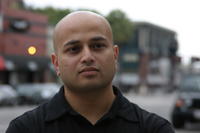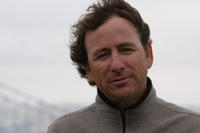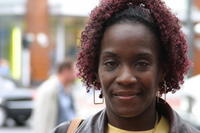Streets of San Francisco

Sean talked to us at the San Francisco intersection where it happened four years earlier. We learned how events became even more tragic. The man who was convicted killed his best friend, the man who started the fight, because he was afraid he would testify against him. Since then, Sean has decided to shift his life course and attend law school to advocate for civil rights.
 After our interview, we decided to shoot b-roll, spending the day in the chilly streets of San Francisco, moving from one location to the next. Sharat, our director (pictured), continued to shoot with his 8mm camera, weaving yet another medium into our film.
After our interview, we decided to shoot b-roll, spending the day in the chilly streets of San Francisco, moving from one location to the next. Sharat, our director (pictured), continued to shoot with his 8mm camera, weaving yet another medium into our film.
 We made our way to a hilltop in Marin County to film the Golden Gate Bridge. Here the crew looked especially stunning and wind-swept (Don Presley, our first camera, on the left, and our entire crew, Don, Matt, Sharat, and Tim in the header image).
We made our way to a hilltop in Marin County to film the Golden Gate Bridge. Here the crew looked especially stunning and wind-swept (Don Presley, our first camera, on the left, and our entire crew, Don, Matt, Sharat, and Tim in the header image).
We made our way to the intersection of Fourth and Market, where a stranger once asked whether I was Muslim and cursed me out while I was sitting in my car. As we were standing and filming at this very intersection, a woman walked up to us, and asked us what we were filming. We told her it was about hate crimes after 9/11. She responded into our microphone:
 “Hate crimes? That’s when you hurt someone for no reason. I can tell you about hate crimes. You know what I call a hate crime? A hate crime is when the police don’t stop the shootings in black neighborhoods, because they’ve decided ‘let them all kill each other.’ You know what I call a hate crime? When politicians make promises to poor people and don’t follow through. You know what else is a hate crime? When you are diagnosed with Hepatitus C and need a kidney transplant, and Medicare puts you off just a month before, and you have a husband and two kids and… I don’t know what I’m going to do. I need healthcare, and they’re just going to let me die.”
“Hate crimes? That’s when you hurt someone for no reason. I can tell you about hate crimes. You know what I call a hate crime? A hate crime is when the police don’t stop the shootings in black neighborhoods, because they’ve decided ‘let them all kill each other.’ You know what I call a hate crime? When politicians make promises to poor people and don’t follow through. You know what else is a hate crime? When you are diagnosed with Hepatitus C and need a kidney transplant, and Medicare puts you off just a month before, and you have a husband and two kids and… I don’t know what I’m going to do. I need healthcare, and they’re just going to let me die.”
She began to cry, solid tears down her dark cheeks. And LATRICIA EVANS began to apologize for telling us about her life. I didn’t know what to do. Except hug her. And tell her that we would post her story.
“God works in mysterious ways,” Latricia said. “Maybe someone will help.”
For the rest of the day, I thought about Latrcia’s interpretation of the label “hate crime.” We’ve debated the term on and on with police officers, legislators, and community members, trying to figure out what counts as a hate crime. But to this poor woman, ‘hate crimes’ are built into the very systems that exclude people from the resources that make a livable life– resources that protect people from crime, deception, and denial of basic needs such as healthcare.
I tried to comprehend relations between different dimensions of violence. The stabbing of a brown man is different from the preventable death of a poor woman. But in both cases, when the faces of the persons affected appeared before me, I saw a common anguish. A common suffering. And a common cry- that it could be otherwise. We have the resources to build a society that does not attack minorities in times of war, that does not allow the poor to suffer. These stories make us ask: why not? what can we do in order to change this reality? what can we do right now?
I’m still discovering the answers in my own life path. But I have this faith that this film, however small, is part of the solution. Help us complete this film with your support.

